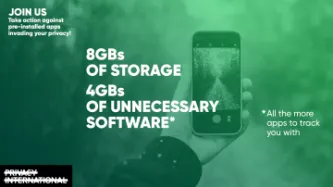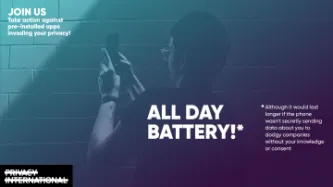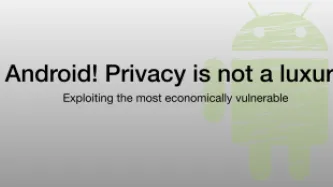Search
Content type: Long Read
“Hey [enter AI assistant name here], can you book me a table at the nearest good tapas restaurant next week, and invite everyone from the book club?” Billions of dollars are invested in companies to deliver on this. While this is a dream that their marketing departments want to sell, this is a potential nightmare in the making.Major tech companies have all announced flavours of such assistants: Amazon’s Alexa+, Google’s Gemini inspired by Project Astra, Microsoft’s Copilot AI companion and…
Content type: Report
Introduction
Several policy initiatives are in progress at the EU level. They seek to address the sustainability of connected devices such as smartphones, tablets and smart speakers. While initiatives to extend the useful life of hardware are important, software must not be ignored. Almost any digital device with which we interact today relies on software to function, which acts as a set of instructions that tells the hardware what to do. From smart thermostats to smart speakers, to our…
Content type: Advocacy
Our environment is increasingly populated by devices connected to the Internet, from computers and mobile phones to sound systems and TVs to fridges, kettles, toys, or domestic alarms. There has been research into the negative safety and privacy impacts of inadequate security provided by the software in such devices (such as the creation of large scale botnets). This is also the case with outdated security, a risk enabled by software support periods that are shorter than a product’s usable life…
Content type: News & Analysis
Back in January, Privacy International and over 50 other organisations wrote to Google asking the company to take action over pre-installed apps that cannot be deleted (often known as “bloatware”), which can leave users vulnerable to their data being collected, shared and exposed without their knowledge or consent. Thousands of people from over 50 countries signed our petition supporting this ask. We welcome the constructive conversations we had with Google following this campaign and for the…
Content type: News & Analysis
Banning TikTok? It's time to fix the out-of-control data exploitation industry - not a symptom of it
Chinese apps and tech companies have been at the forefront of the news recently. Following India's ban of 59 chinese apps in July, President Trump announced his desire to ban TikTok, shortly followed by his backing of Microsoft's intention to buy the US branch of its parent company ByteDance. Other than others lip syncing his public declaration, what does President Trump fear from this app, run by a firm, based in China?
It's all about that data
One clear answer emerges: the exploitation of…
Content type: Examples
Three days after announcing Germany would adopt the centralised Pan-European Privacy-Preserving Proximity Tracing (PEPP-PT) standard for contact tracing, the country's chancellery minister Helge Braun and health minister Jens Spahn announced they would instead use the decentralised approach backed by Apple, Google, and other European countries. While both standards rely on Bluetooth connections between nearby phones, PEPP-PT would have required Apple's cooperation to implement, and the company…
Content type: Long Read
‘Let’s build an app for that’ has become the response to so many things. It’s no surprise it’s happening now.
Apps are notorious for their lack of security and privacy safeguards, exploiting people’s data and devices. Now we’re being asked to trust governments with their proposed apps -- of which there are many. These are the very same governments who have been keen to exploit data in the past. For instance, PI currently has four outstanding legal cases arising from the last times governments…
Content type: Examples
Google has begun publishing "COVID-19 Community Mobility Reports", which analyse the location data it collects from smartphones to create maps of aggregated changes in the movement of populations around the world. Google claims the data is "anonymised" via differential privacy, and suggests that governments can use the results of its analysis to understand not only whether people are travelling but where, so they can adapt transport policies to ensure adequate distancing. It is unclear how…
Content type: Examples
Apple and Google have announced a partnership to enable governments and health agencies to use Bluetooth for proximity-based contact tracing to help reduce the spread of the novel coronavirus while preserving user privacy and security. The effort is due to begin with the May release of APIs that will enable Android and iOS devices using apps from public health authorities to interoperate. The two companies will go on to build Bluetooth-based contact tracing into their underlying platforms. The…
Content type: Examples
On November 3rd, 2019, [...] a critical vulnerability affecting the Android Bluetooth subsystem [was reported]. This vulnerability has been assigned CVE-2020-0022 and was now patched in the latest security patch from February 2020. The security impact is as follows:
On Android 8.0 to 9.0, a remote attacker within proximity can silently execute arbitrary code with the privileges of the Bluetooth daemon as long as Bluetooth is enabled. No user interaction is required and only the Bluetooth MAC…
Content type: Examples
After Asian countries used mass surveillance of smartphones to trace contacts and halt the spread of the coronavirus, Western countries such as the UK and Germany are trying to find less-invasive ways to use phones to collect and share data about infections that would work within data privacy laws and retain public trust. Nearly half of virus transmissions may occur before the individual shows symptoms of the disease. At Oxford researchers are working on a notification app that would notify…
Content type: Video
Find out why 53 organisations from all over the world are telling Google it's time they take action on pre-installed apps (bloatware).
You can listen and subscribe to the podcast where ever you normally find your podcasts:
Spotify
Apple podcasts
Google podcasts
Castbox
Overcast
Pocket Casts
Peertube
Youtube
Music by Glass Boy, find more of their work here: glassboy.bandcamp.com/album/enjoy
(creativecommons.org/licenses/by-nd/3.0/)
Content type: News & Analysis
Maddie Stone, formally a Senior reverse engineer and tech lead on the Android security team, shockingly revealed a number of examples of how pre-installed apps on Android devices can undermine users privacy and security in her BlackHat USA talk in August 2019. The video of the talk only recently became available to the public in late December 2019.
The apps in question come preloaded on a device when it is purchased and often can't be removed. Stone reveals a litany of abuses carried out by…
Content type: Advocacy
Puede encontrar la carta a continuación. Agregue su voz a esta campaña firmando nuestra petición si cree que es hora de que Google deje de permitir la explotación.
Nota: Esta carta también está disponible en francés e inglés.
Estimado Sr. Pichai,
Nosotros, los firmantes, estamos de acuerdo con usted: la privacidad no puede ser un lujo reservado para las personas que tienen la capacidad de pagar por ella.
Sin embargo, los socios de Android Partner –que utilizan la marca y la imagen de…
Content type: Advocacy
You can find the letter below. Add your voice to this campaign by signing our petition if you believe that its time Google stopped enabling exploitation.
Note: This letter is also available in French and Spanish
Dear Mr. Pichai,
We, the undersigned, agree with you: privacy cannot be a luxury offered only to those people who can afford it.
And yet, Android Partners - who use the Android trademark and branding - are manufacturing devices that contain pre-installed apps that cannot be deleted…
Content type: Advocacy
Vous pouvez trouver la lettre ci-dessous. Ajoutez votre voix à cette campagne en signant notre pétition si vous pensez qu'il est temps que Google cesse d'activer l'exploitation.
Ce contenu est également disponible en anglais et en espagnol.
Cher M. Pichai,
Nous, les organisations signataires, sommes d’accord avec vous :
la vie privée n’est pas un luxe, offert seulement à ceux qui en ont les moyens.
Pourtant, les « Android Partners » – qui utilisent la marque déposée…
Content type: Long Read
Content type: Explainer
Abstract
Over the past few years, smart phones have become incredibly inexpensive, connecting millions of people to the internet for the first time. While growing connectivity is undeniably positive, some device vendors have recently come under scrutiny for harvesting user data and invasive private data collection practices.
Due to the open-source nature of the Android operating system vendors can add pre-installed apps (often called “bundled apps” or "bloatware") to mobile phones.…
Content type: Long Read
In December 2018, Privacy international exposed the dubious practices of some of the most popular apps in the world.Out of the 36 apps we tested, we found that 61% automatically transfer data to Facebook the moment a user opens the app. This happens whether the user has a Facebook account or not, and whether they are logged into Facebook or not. We also found that some of those apps routinely send Facebook incredibly detailed and sometimes sensitive personal data. Again, it didn’t matter if…
Content type: News & Analysis
Privacy International has joined a global coalition of privacy campaigners, tech companies, and technology experts to respond to proposals by British intelligence chiefs aimed at allowing them access to encrypted messaging apps such as WhatsApp or Signal.
If implemented, the proposals would allow government authorities to force messaging platforms to silently add a law enforcement participant to a group chat or call.
Such a capability poses serious threats to…
Content type: Examples
In February 2019 Google engineers announced that they had created faster, more efficient encryption system that could function on less-expensive Android phones that were too low-powered to implement existing full-device encryption. The scheme, known as Adiantum, uses established and well-vetted encryption tools and principles. Android has required smartphones to support encryption since 2015's version 6, but low-end devices were exempt because of the performance hit. It will now be up to device…
Content type: Examples
Google launched its first version of Android in 2009. Based on a modified Linux kernel and other open source software, Android provides the operating system for mobile phones, tablets, televisions, cars, wrist watches, and many other devices including digital cameras, game consoles, PCs, and personal video recorders. By 2017, Android had become the best-selling operating system in the world, with over 2 billion monthly active users. Even in 2009, critics warned that the operating system, which…














